Microsoft Orleans Overview: Actors, Grains, and Cloud-Native Architecture
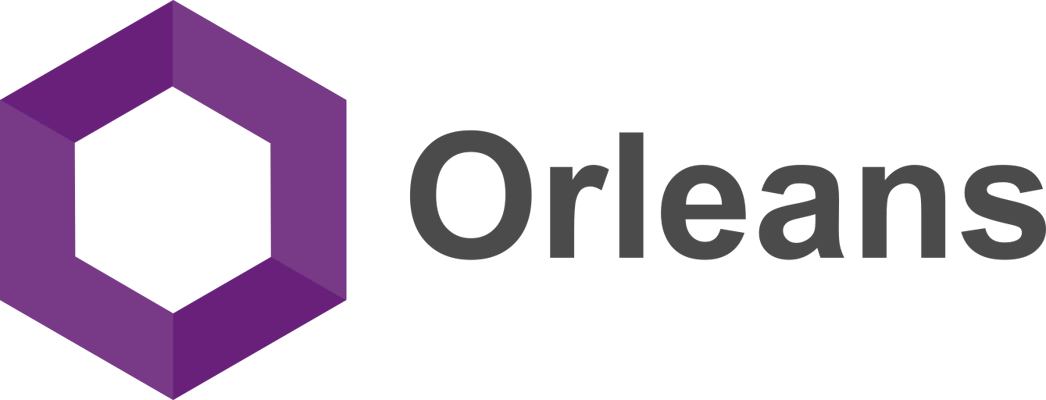
Overview of the Microsoft Orleans framework: virtual actors, grains, runtime, and use cases. Build scalable, fault-tolerant distributed systems in .NET.
📘 Introduction to Microsoft Orleans
Let’s first clarify the terminology and main concepts:
🤔 What is Microsoft Orleans?
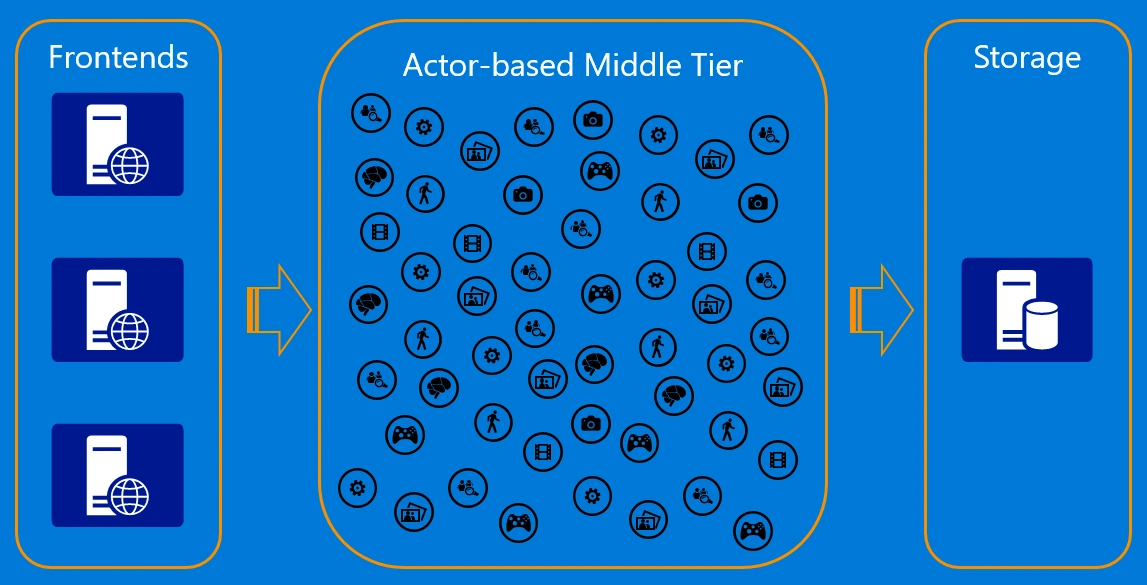
How do you keep millions of Xbox players connected in real time? Or ensure Skype delivers every message, even when servers fail? Microsoft faced these challenges and built a framework to solve them — Orleans.
Microsoft Orleans is a framework for building scalable and fault-tolerant cloud applications. It abstracts away the complexity of distributed systems, letting developers focus on business logic instead of the tricky parts of concurrency, retries, and state management.
The key idea is the Virtual Actor Model. Orleans introduces grains — lightweight, distributed objects that manage their own state and communicate through messages. With grains, scaling an app across servers or handling failures happens automatically, without custom plumbing code.
👤 What is the Actor Model?
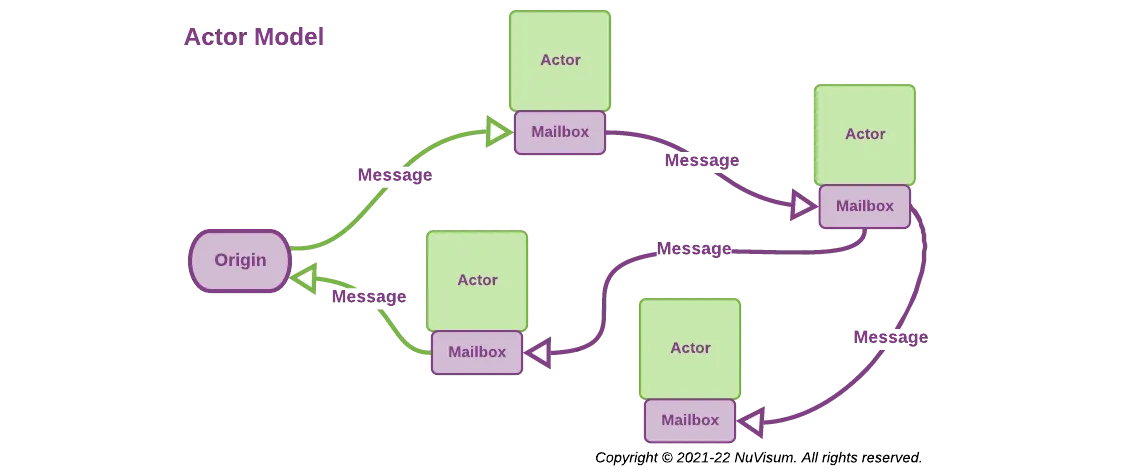
Actor Model is a model of concurrent computation where the central units are actors. Actors are independent objects that:
- Process messages: Each actor has its own message queue and processes them one at a time.
- Can create new actors: this makes it easy to scale the system.
- Can send messages to other actors: interaction between components happens via message passing.
- Can change their state: an actor can update its internal state when processing messages.
The actor model simplifies the development of concurrent and distributed systems, as each actor’s state is isolated, and communication occurs through message passing. This helps avoid many problems related to simultaneous access to shared state (e.g., race conditions).
In Microsoft Orleans, the roles of virtual actors are played by grains.
🔧 Orleans Runtime
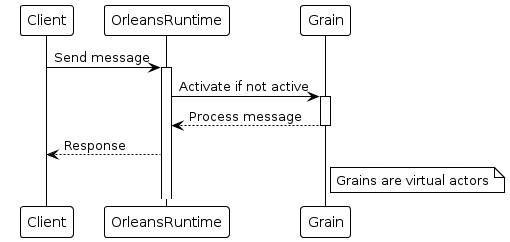
Orleans Runtime is the execution environment that supports and manages actors in an Orleans system. The runtime provides:
- Automatic scaling: Orleans Runtime automatically distributes actors across different nodes (server machines) in a cluster to optimally use resources.
- State management: actor states are automatically persisted and restored in case of failures, ensuring fault tolerance.
- Error handling: Orleans Runtime includes mechanisms for automatic recovery after failures, restarting actors on other nodes.
- Flexible deployment: supports various deployment configurations, including local and cloud environments.
- Guarantees single-threaded execution and only one instance for stateful grains
- Allows multiple instances of stateless grains if required for performance
Orleans Runtime makes building and managing distributed applications efficient and straightforward, allowing developers to focus on application logic instead of infrastructure details.
❓ Why Microsoft Orleans Instead of a Custom Solution?

You might think:
“Why do I need Orleans? I could build a few microservices, store state in a database or cache, and connect them with a message broker.”
That works at a small scale. But let’s look at what happens when your system grows:
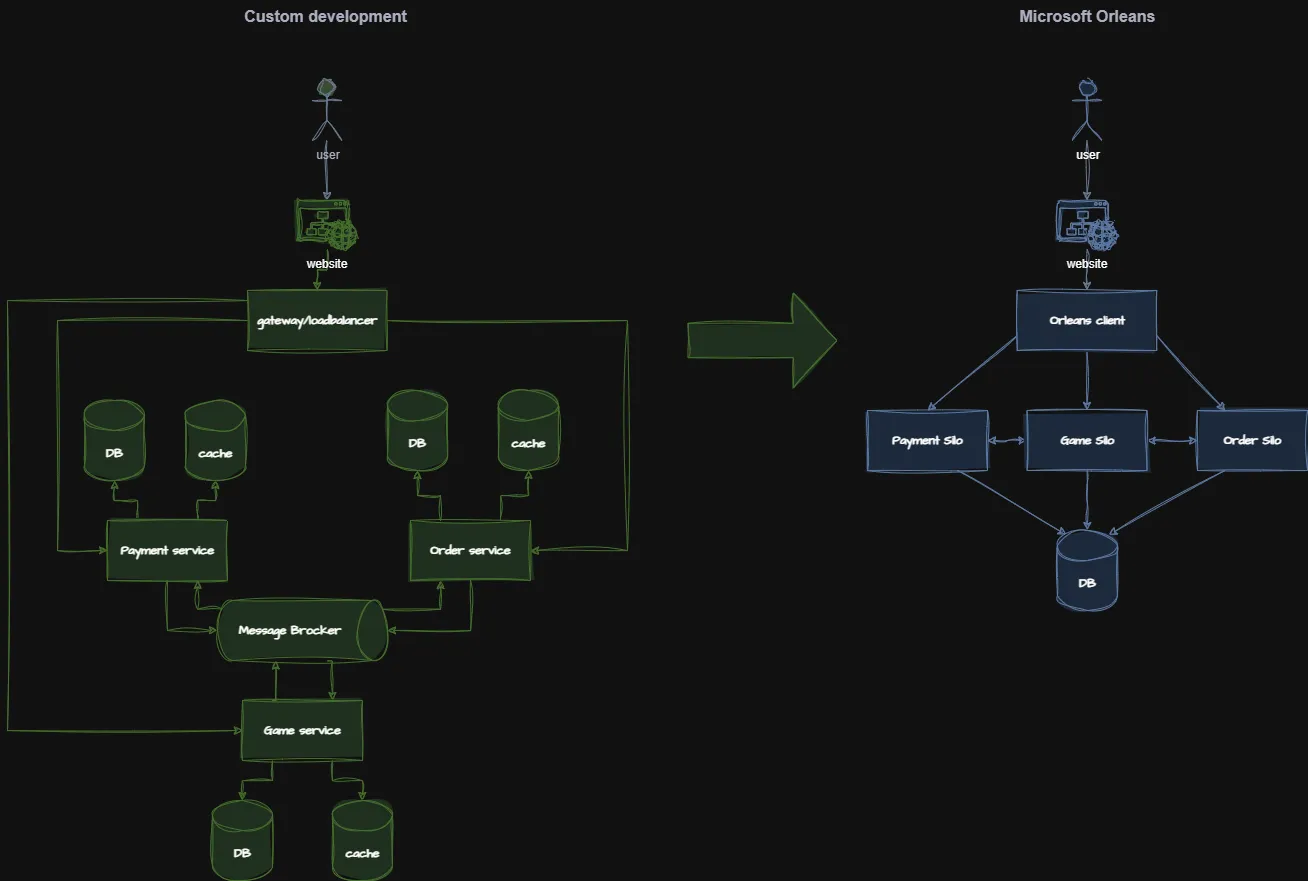
With just three microservices, you already need:
- A separate database for each service
- A cache layer to improve performance
- A message broker for communication
- Custom code for retries, consistency, and failover
- In real projects with dozens of services, these cross-cutting concerns consume most of the development effort. Each team has to reinvent solutions for scaling, state management, and fault tolerance.
This is where Orleans shines. Its runtime provides all of this infrastructure out of the box:
- Virtual actors (grains) manage their own state
- Automatic scaling across multiple servers
- Fault tolerance with built-in recovery
- Multi-server environments are supported by default — run one or many silos with zero extra effort
👉 In short: Orleans lets you focus on business logic, while it handles the complex parts of distributed systems.
🏛️ Microsoft Orleans Architecture
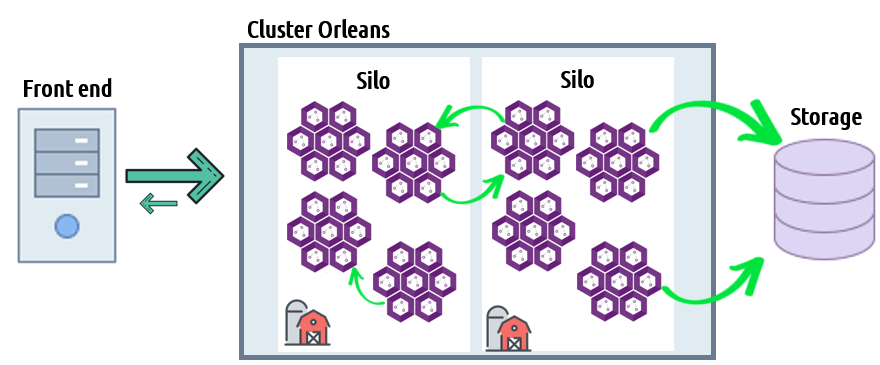
🛠️ Component Overview
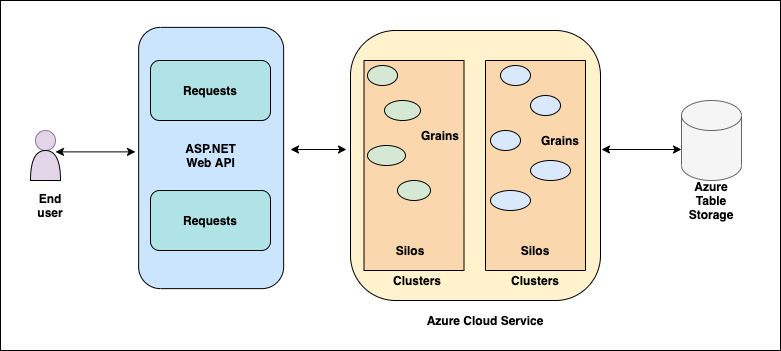
Orleans consists of:
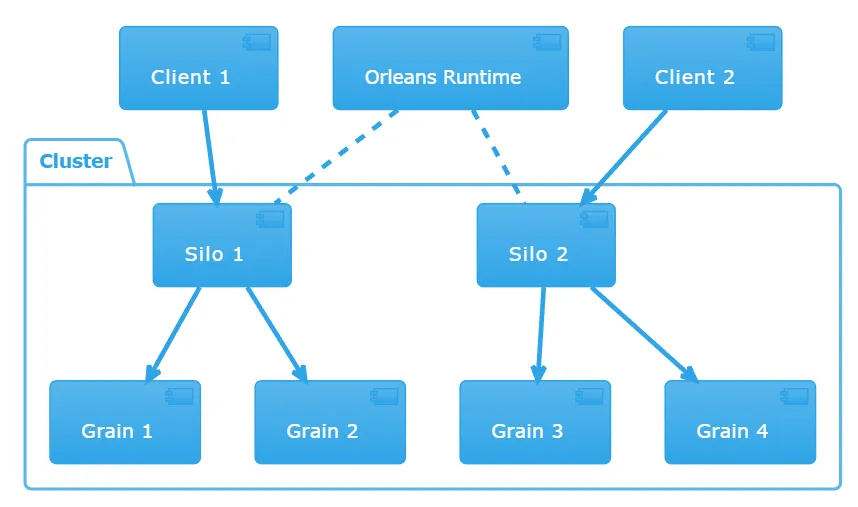
- Virtual Actors (Grains): logical units of execution that encapsulate state and behavior. They live inside Silos and communicate with each other via message passing.
- Silos: containers that run and store Grains, distributing load and ensuring fault tolerance. Each Silo can host many Grains.
- Clients: external applications that interact with Grains through Silos.
- Cluster: a set of interconnected Silos forming a distributed system that provides resilience, load distribution, and scalability.
- Orleans Runtime: the execution environment that manages interactions between components, scaling, error handling, and failure recovery.
👥 Virtual Actors (Grains)
Grains are the central computation units in Orleans. Grains represent actors that encapsulate state and behavior. They are “virtual” because their activation, deactivation, and placement are fully managed by the Orleans Runtime. A Grain’s state is stored in memory while the grain is active, reducing latency and lowering the load on persistent storage.
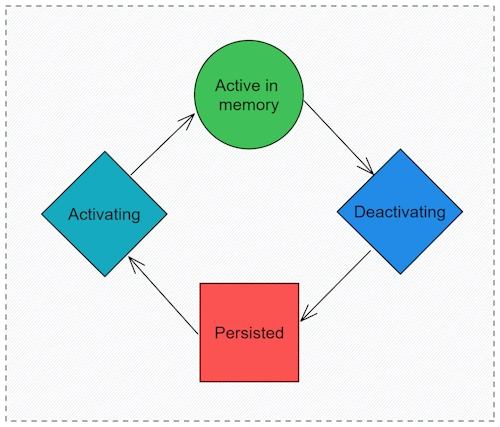
Advantages of Grains:
Fewer database read operations:
- Hot/warm data is kept in memory, cold data in a database.
- No need for a separate cache layer.
Fewer write conflicts: Each Grain owns its own state.
Fewer cache consistency issues:
- Write operation updates the Grain’s state, then the Grain writes to the database.
- Grains work like a Write-Through cache.

- Better scalability: Grains are distributed across your app instances.
- Low-latency writes: No need for async queues or background workers.
- Simplicity: Less code, fewer failure-handling cases, fewer retries.
- Automatic lifecycle management: Orleans Runtime automatically creates and destroys Grains as needed, simplifying resource management.
- Scalability: Because Grains are distributed across different Silos, Orleans makes it easy to scale apps.
- Fault tolerance: Grain states are automatically saved and restored in case of failures, ensuring system continuity.
🏢 Silos
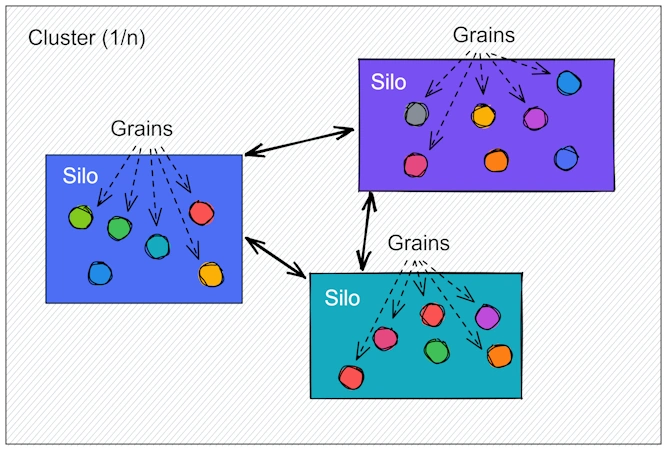
Silos are containers that store Grains. They balance the load and ensure system fault tolerance. Each Silo can interact with other Silos, forming a single distributed system.
🔗 Clients
Clients interact with Grains through Silos. They initiate data queries or request processing.
Client types:
Co-hosted
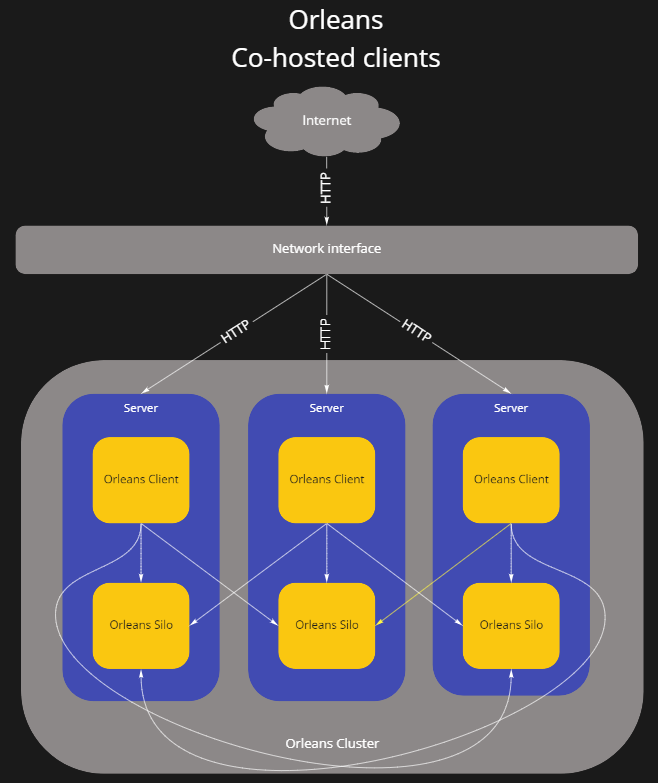
This provides several advantages, including reduced network/CPU load, lower latency, increased throughput, and reliability. The client uses the node’s knowledge of cluster topology and state, without needing a separate gateway. This avoids extra network hops and unnecessary serialization/deserialization. As a result, reliability increases since the number of nodes between the client and Grain is minimized.
External clients
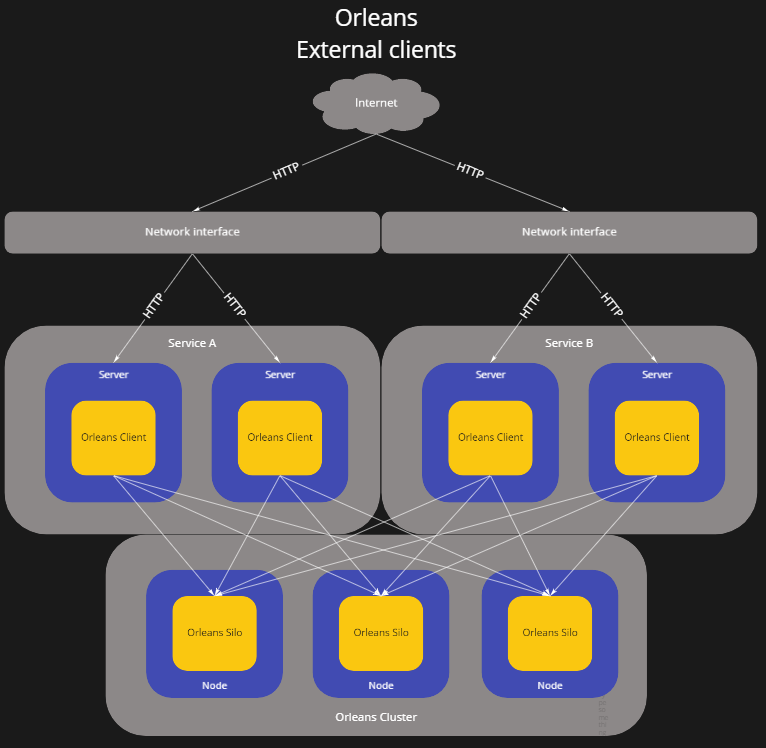
Client code can run outside the Orleans cluster where the Silo is hosted. In this case, an external client acts as a connector or channel to the cluster and its components. Typically, external clients are used on web servers that connect to the Orleans cluster, which serves as the middle layer that runs business logic.
📡 Cluster
A cluster is a group of interconnected Silos working together. The cluster provides scalability, resilience, and load distribution. In Orleans, Silos automatically coordinate to evenly distribute Grains and manage their state. Clustering ensures the system remains stable and available even if one or more Silos fail.
✨ Key Features of Orleans
👥 Virtual Actor Model
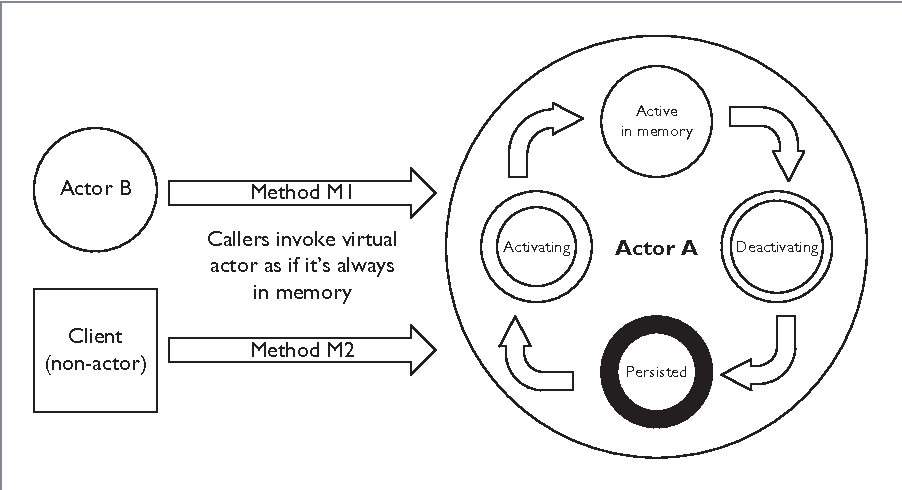
Grains are created and destroyed automatically. They encapsulate state and behavior, which simplifies parallel execution and scaling.
💾 State Management
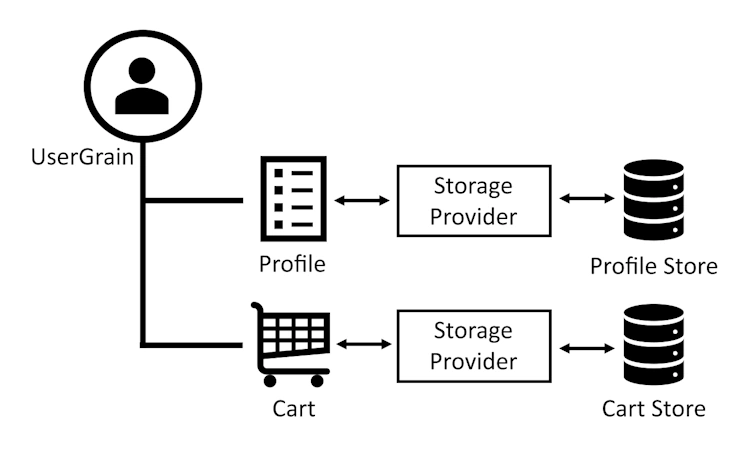
Grain state can be stored in memory or in storage systems such as SQL, NoSQL, etc. Orleans supports transactions and ensures data consistency.
⚖️ Load Balancing and Fault Tolerance
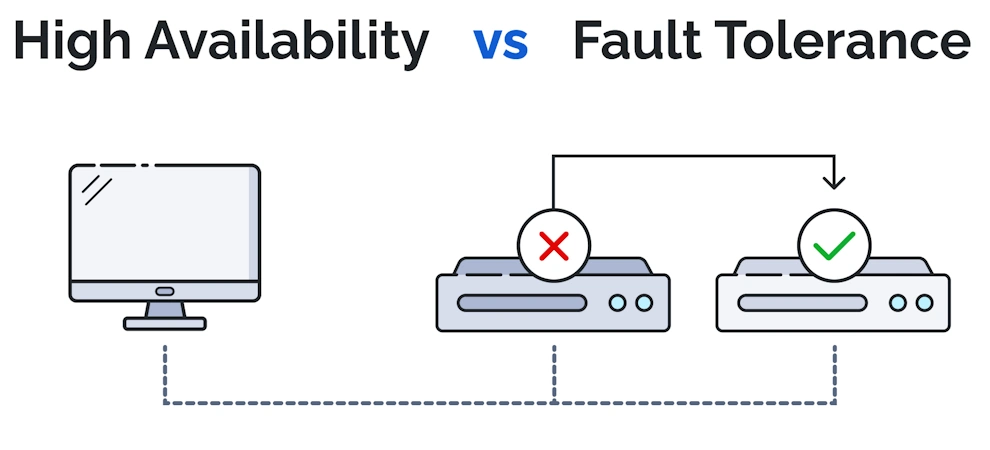
Orleans automatically distributes Grains across Silos and restores their work in case of failures.
🛠️ Easy Integration and Deployment
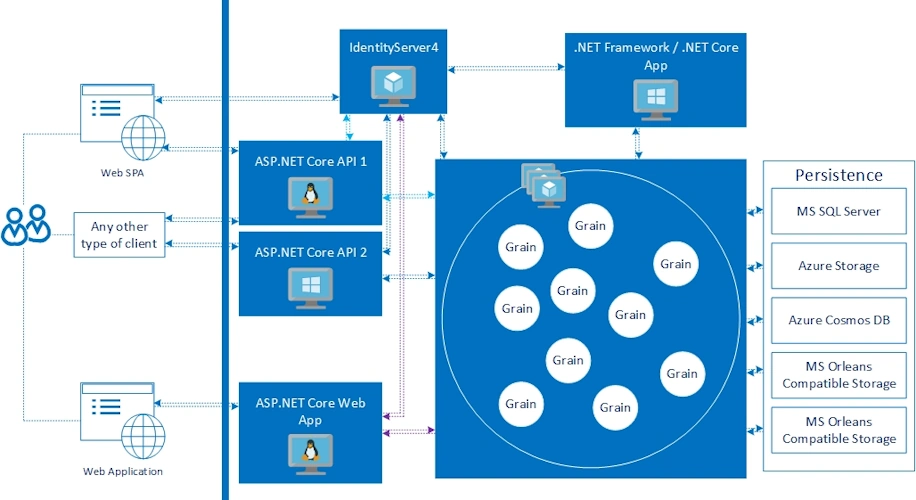
Orleans supports cloud deployment and integrates easily with existing systems.
🔄 Asynchronous Programming
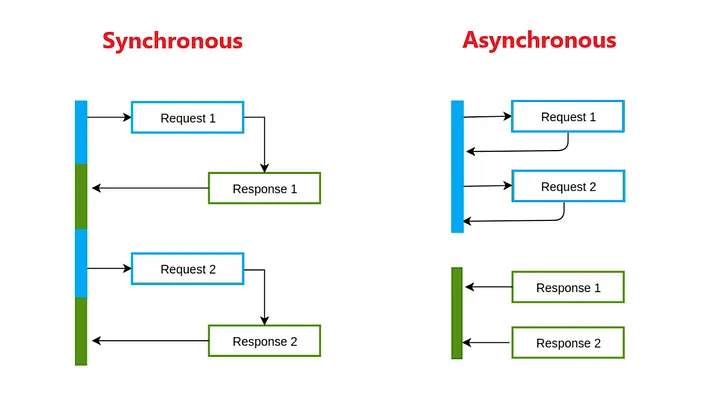
Communication is done through async methods, which impacts the following:
- Increased performance: async operations allow efficient resource usage and faster execution of tasks.
- Simplified concurrency handling: with built-in async support, developers can easily manage parallel operations without complex synchronization logic.
🌍 Rich Ecosystem and Community Support

Orleans has an active community and is supported by Microsoft:
- Regular updates and improvements: Microsoft and the developer community continuously update Orleans, adding new features and improving performance.
- Documentation and examples: extensive documentation and GitHub projects (OrleansContrib, orleans) help developers get started quickly.
- Integration with popular tools: Orleans integrates with various tools and libraries, simplifying development and deployment.
🔍 Monitoring and Diagnostics Tools

Orleans provides monitoring and diagnostic tools that help maintain stability and performance:
- Telemetry support: Orleans can collect and send real-time performance and health data.
- Error diagnostics: built-in mechanisms quickly detect and resolve issues in the system.
For example, you can connect the community-built NuGet package OrleansDashboard to get a web interface for monitoring the state of your Orleans cluster:
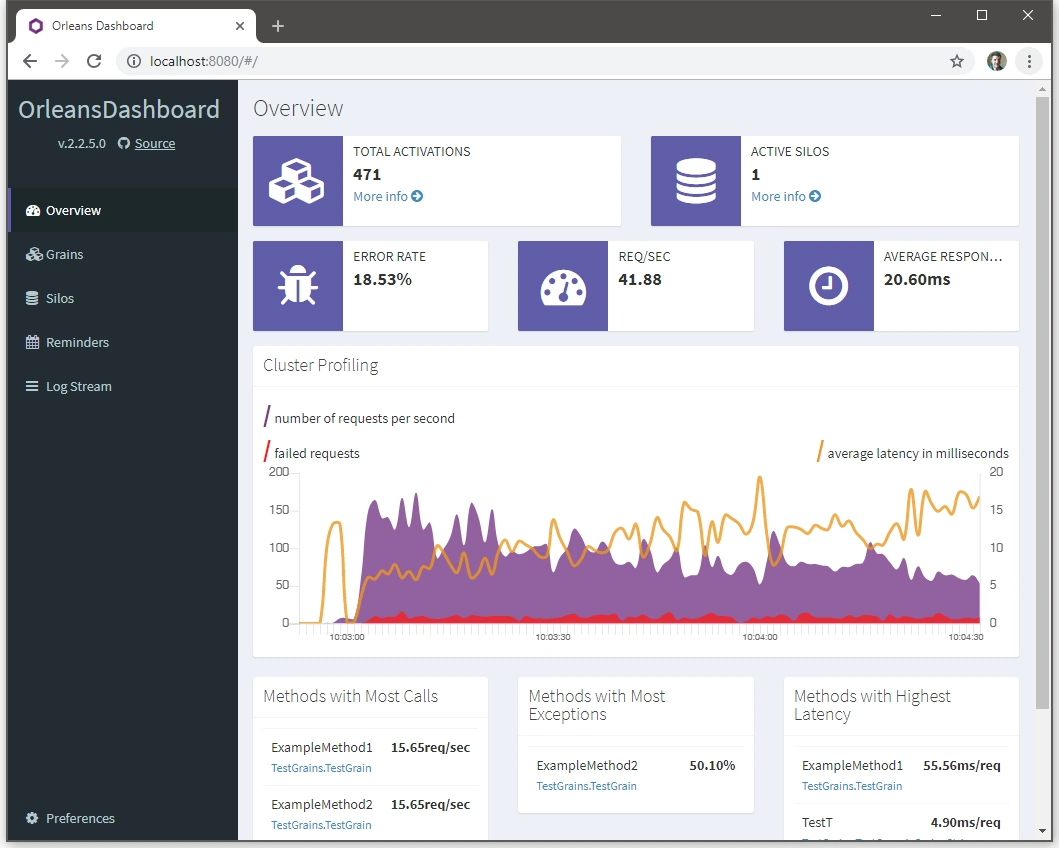
💼 Use Cases for Orleans
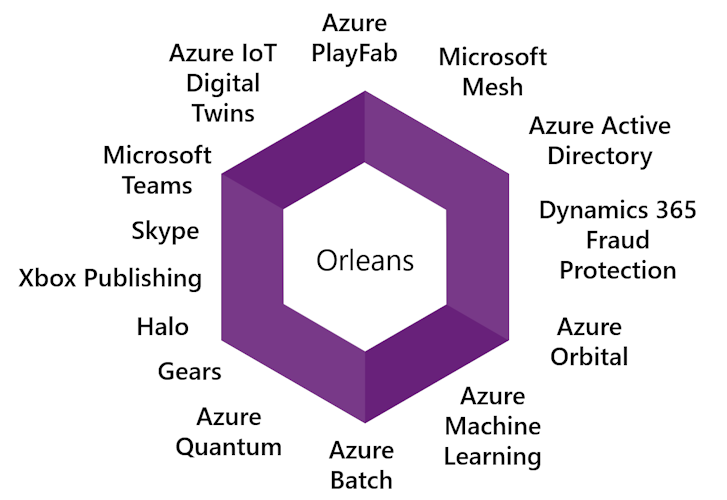
Microsoft Orleans provides flexible capabilities for building scalable and reliable distributed systems. However, like any tool, Orleans is not suitable for every scenario. The following examples illustrate suitable and unsuitable use cases for Orleans, based on established best practices and recommendations.
✔️ Suitable Use Cases

Orleans offers powerful capabilities for building scalable and resilient systems, making it an excellent solution for the following scenarios:
1. 🌐 Scalable Cloud Services
Orleans is perfect for applications deployed in the cloud that require scalability.
Example: Azure and other Microsoft cloud services. Orleans is actively used in Microsoft Azure and other platforms, powering services like Xbox, Skype, and PlayFab with scalability and reliability.
2. 🎮 Gaming
Orleans is widely used for real-time management of player and game object states.
Example: Halo and Gears of War. These games use Orleans to manage player and game states, ensuring smooth gameplay and support for millions of users.
3. 💳 Financial and Banking Systems
Suitable for transaction processing and state management (e.g., online banking systems).
4. 💬 Messaging Applications
Provides fast and reliable message delivery.
Example: Skype. Orleans is used in Skype for real-time message processing and managing user sessions.
5. 📡 IoT
Manages the state and interactions of numerous devices.
6. 🛒 E-commerce
Useful for managing shopping cart states and orders.
7. 🗳️ Voting Systems
Supports high reliability and data accuracy.
8. 📉 Stock Trading
Processes high volumes of real-time data and transactions.
🚫 Unsuitable Use Cases
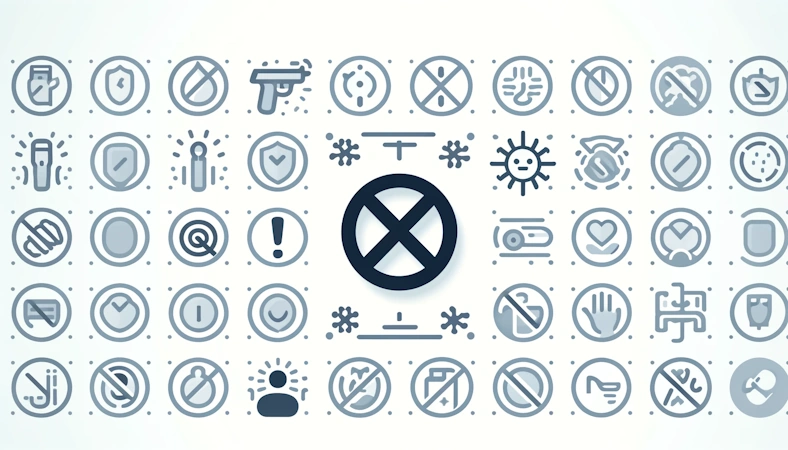
1. 📋 Simple CRUD Applications
Apps that only create, read, update, and delete database records might not require Orleans’ capabilities.
Example: Simple enterprise web apps. If your app mainly performs basic CRUD operations without complex business logic, traditional tools may be a better fit.
2. 🧮 Heavy Computational Workloads
Orleans is not designed for tasks requiring intensive computation, like heavy number crunching or video rendering.
Example: Scientific computing or graphics rendering. Apps needing significant compute resources are better built with specialized tools.
3. 📉 Apps with Low Scalability Needs
If your app doesn’t need significant scalability or user growth, Orleans might be overkill.
Example: Local business applications. For small-scale apps with limited users, Orleans may not justify its complexity.
4. 🔗 Tightly Coupled Systems
Orleans works best for systems with isolated components and minimal interdependent states.
Example: Monolithic apps with tightly coupled components. Applications where components share lots of interdependent state won’t gain the full benefits of Orleans.
🔍 How Microsoft Orleans Works

Now that we’ve covered the basics, let’s dive a bit deeper and see how it all works.
🏗️ Reference Architecture: Orleans in k8s
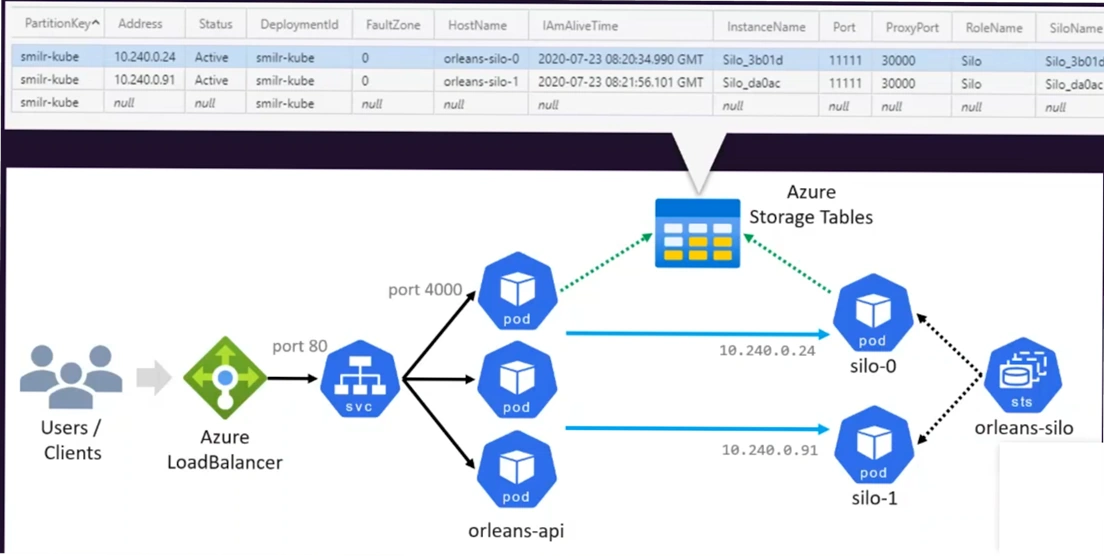
To simplify understanding, let’s look at an example of Orleans architecture deployed in Azure Kubernetes Service. Let’s break down the elements we see:
- Load balancer – distributes traffic to the Orleans API.
- orleans-api – acts as a Microsoft Orleans client.
- Silo-0, silo-1 – Silo instances in k8s.
- Azure storage tables – used as storage and membership tables (see the example above, showing two active Silos).
Essentially, the most essential pieces are the Silos and persistence storage, where information about active Silos and their state is kept.
If you need a refresher on Kubernetes concepts, check out our article, which explains the basics in simple terms.
🔗 Cluster Membership in Orleans
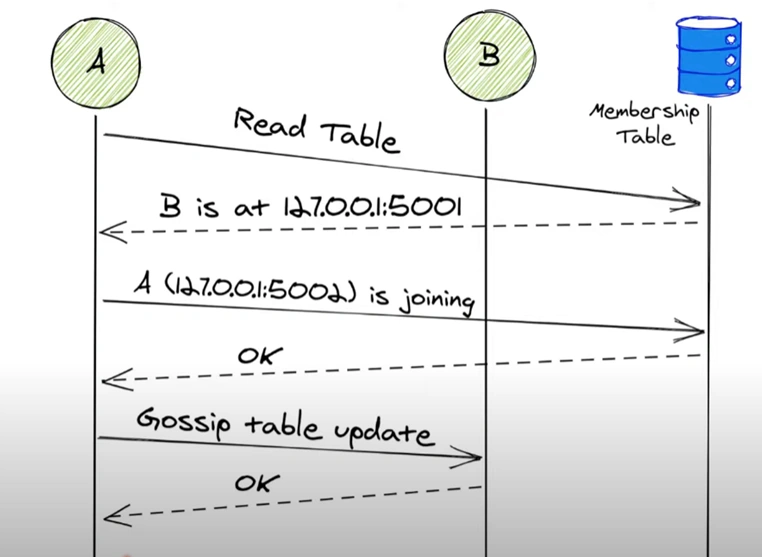
Orleans manages cluster membership by automatically adding and removing Silos. This ensures scalability and fault tolerance. Each Silo tracks the state of other Silos and coordinates actions to keep membership info up to date.
Main aspects of Cluster Membership:
- Dynamic addition/removal of Silos: Orleans supports adding new Silos to scale up or removing them to scale down without restarting the cluster.
- Failure detection: Orleans constantly monitors each Silo. If a node fails, Orleans quickly detects it and redistributes Grains to other healthy Silos.
- Coordination and consistency: Each Silo maintains a registry of cluster members. Orleans uses distributed algorithms to ensure consistency of this info when adding nodes or handling failures.
- Failure recovery: When a Silo fails, Orleans automatically reassigns its Grains to other nodes, minimizing system disruption.
Gossip contains some or all of the following data:
- Current multi-cluster configuration with timestamp.
- A dictionary containing gateway info for clusters. Key = gateway address, value = timestamp, cluster ID, and status (active/inactive).
📊 Monitoring in Orleans
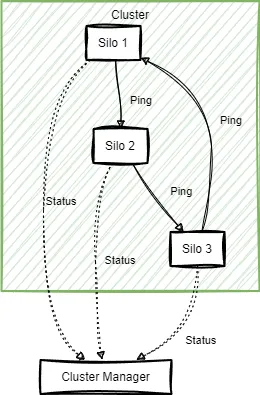
Orleans uses a “ping-pong” mechanism to check Silo availability. If a Silo doesn’t respond, Orleans redirects requests to other nodes, ensuring fault tolerance.
Ping-Pong:
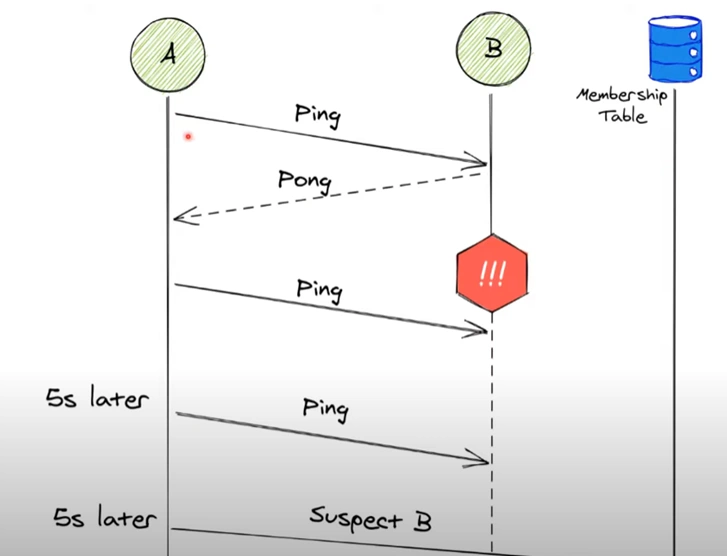
- Regular health checks: Each Silo periodically sends ping messages to other nodes. This verifies availability.
- Failure/latency detection: If a Silo doesn’t respond within a set time, it’s marked unavailable. This helps quickly detect failures.
- Load balancing: Node health checks also assist in distributing load. If one Silo is overloaded, Orleans can shift some requests to others.
- Integration with external monitoring: Orleans integrates with external tools like Azure Monitor for deeper insights.
💻 Grain Implementation in Orleans
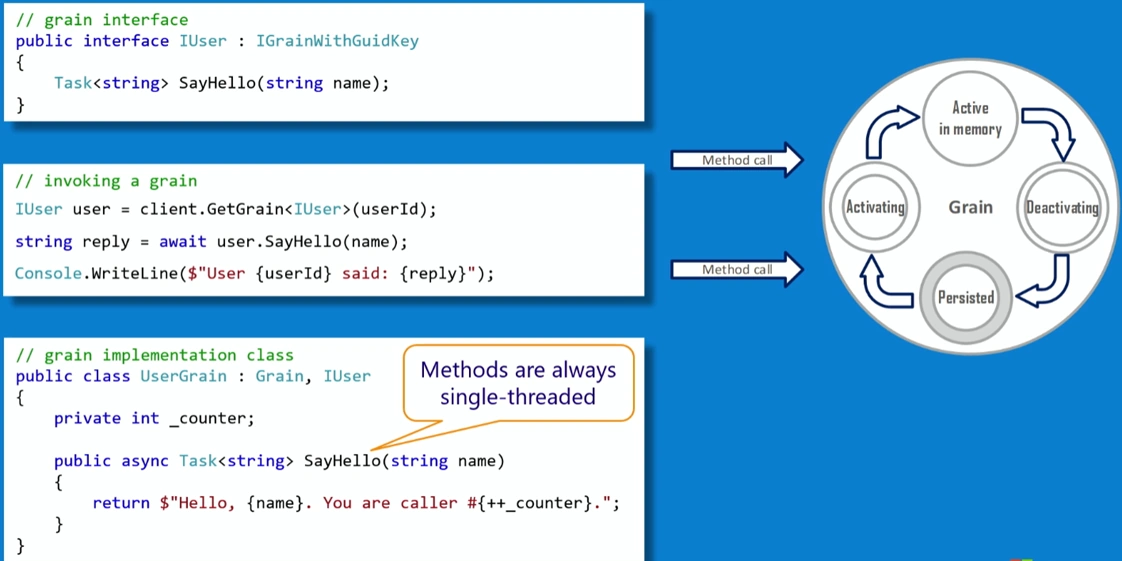
Grains implement business logic and manage state. Orleans automatically handles their creation, destruction, and state persistence.
Here’s an example implementation of PlayerGrain from Microsoft’s docs:
public interface IPlayerGrain : IGrainWithGuidKey
{
Task<IGameGrain> GetCurrentGame();
Task JoinGame(IGameGrain game);
Task LeaveGame(IGameGrain game);
}
public class PlayerGrain : Grain, IPlayerGrain
{
private IGameGrain _currentGame;
public Task<IGameGrain> GetCurrentGame()
{
return Task.FromResult(_currentGame);
}
public Task JoinGame(IGameGrain game)
{
_currentGame = game;
Console.WriteLine(
$"Player {GetPrimaryKey()} joined game {game.GetPrimaryKey()}");
return Task.CompletedTask;
}
public Task LeaveGame(IGameGrain game)
{
_currentGame = null;
Console.WriteLine(
$"Player {GetPrimaryKey()} left game {game.GetPrimaryKey()}");
return Task.CompletedTask;
}
}Available Grain Key Types
Grains support several different types of primary keys. These keys give you access to a specific Grain instance:
- IGrainWithGuidKey: for grains with
Guidkeys. - IGrainWithIntegerKey: for grains with
Int64keys. - IGrainWithStringKey: for grains with
stringkeys. - IGrainWithGuidCompoundKey: for grains with compound
Guidkeys. - IGrainWithIntegerCompoundKey: for grains with compound
Int64keys.
Stateless Grain
In Microsoft Orleans, there are two types of Grains: stateful (state is persisted) and stateless (no state is persisted). Understanding the difference is essential for practical usage. Let’s examine the concept of a stateless grain in more detail and consider when it should be used.
Stateless Grain is a type of Grain that does not persist or manage state between calls. Unlike stateful grains, which can keep data in memory or databases and restore it later, stateless grains are “stateless.” Each method call is independent and does not rely on data from previous calls.
Stateless grains are ideal for scenarios where state persistence is unnecessary. Typical use cases:
- Real-time request handling: Stateless grains can handle requests that don’t depend on previous data (e.g., HTTP request processing in web apps or APIs).
- Math or logic computations: Great for calculations that don’t require saving intermediate results (e.g., metrics or reports).
- Working with external resources: Useful when interacting with external APIs or databases that manage state externally.
- Load distribution: Stateless grains can be activated on multiple nodes simultaneously, making them perfect for spreading incoming requests.
Note: A stateful grain always has only one instance per Silo, while a stateless grain can have more than one. This is configured via code:
[StatelessWorker(2)] // max 2 activations per silo
public class MyLonelyWorkerGrain : ILonelyWorkerGrain
{
//...
}Grain Placement Strategy
Since Grains can be placed in different Silos (even across clusters/servers), Orleans provides strategies to determine where an activated Grain should live. You can also define custom strategies.
Existing strategies include:
- Random placement – default strategy.
- Local Placement – chooses the local server if compatible, otherwise random.
- Hash-based placement – hashes the grain ID into a number and selects a server based on available servers ordered by address.
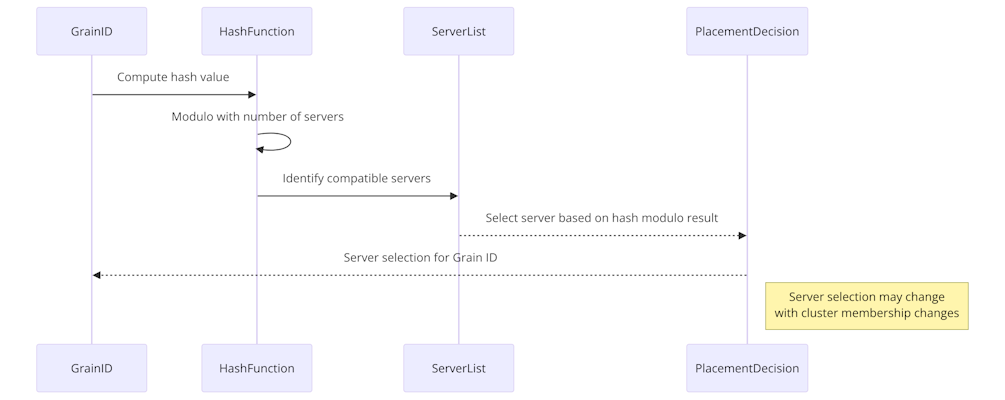
- Activation-count-based placement – places new activations on the least busy server based on recent Grain counts. Servers periodically broadcast their activation counts, and the placement director predicts which server currently has the lowest load.
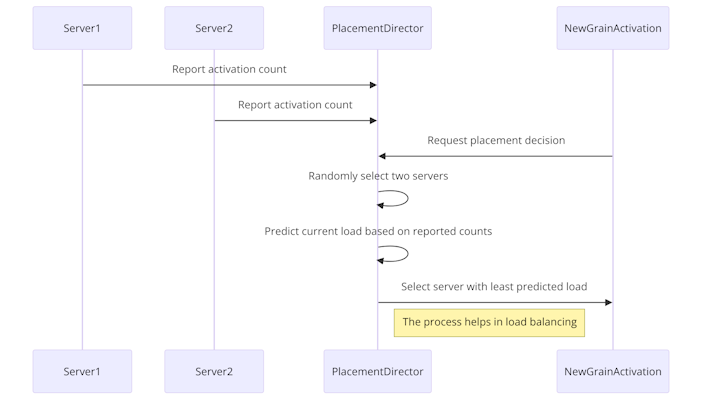
- Stateless worker placement – special strategy for stateless grains. Similar to PreferLocalPlacement, but allows multiple activations of the exact grain per server. These grains are not registered in the grain directory.
- Silo-role based placement – deterministic placement into Silos with a specified role, using the
SiloRoleBasedPlacementAttribute. - Resource-optimized placement – optimizes cluster resources by balancing activations across Silos based on memory and CPU usage. It assigns weights to runtime stats to calculate a normalized score for each Silo and chooses the one with the lowest score. Weight factors can be tuned via
ResourceOptimizedPlacementOptions. See details here.
More about placement strategies can be found in the docs.
📦 Persistence Structure in Orleans
Orleans Storage Providers
Out of the box, Orleans provides the following storage providers:
- Microsoft.Orleans.Persistence.AdoNet
- Microsoft.Orleans.Persistence.AzureStorage
- Microsoft.Orleans.Persistence.Cosmos
- Microsoft.Orleans.Persistence.DynamoDB
The base of persistence is the IPersistentState interface methods:
public interface IPersistentState<TState> where TState : new()
{
TState State { get; set; }
string Etag { get; }
Task ClearStateAsync();
Task WriteStateAsync();
Task ReadStateAsync();
}In a Grain implementation, we use an attribute to specify which storage to use, e.g.:
[StorageProvider(ProviderName="store1")]
public class UserGrain : Grain, IUserGrain
{
private readonly IPersistentState<ProfileState> _profile;
public UserGrain(
[PersistentState("profile", "profileStore")]
IPersistentState<ProfileState> profile)
{
_profile = profile;
}
public Task<string> GetNameAsync() => Task.FromResult(_profile.State.Name);
public async Task SetNameAsync(string name)
{
_profile.State.Name = name;
await _profile.WriteStateAsync();
}
}If we want to implement our own persistence store (e.g., Redis), we need to override IGrainStorage methods:
public interface IGrainStorage
{
Task ReadStateAsync<T>(string stateName, GrainId grainId, IGrainState<T> grainState);
Task WriteStateAsync<T>(string stateName, GrainId grainId, IGrainState<T> grainState);
Task ClearStateAsync<T>(string stateName, GrainId grainId, IGrainState<T> grainState);
}Orleans Storage Tables Structure
If we look at the tables used by Orleans inside storage, we’ll see the following:
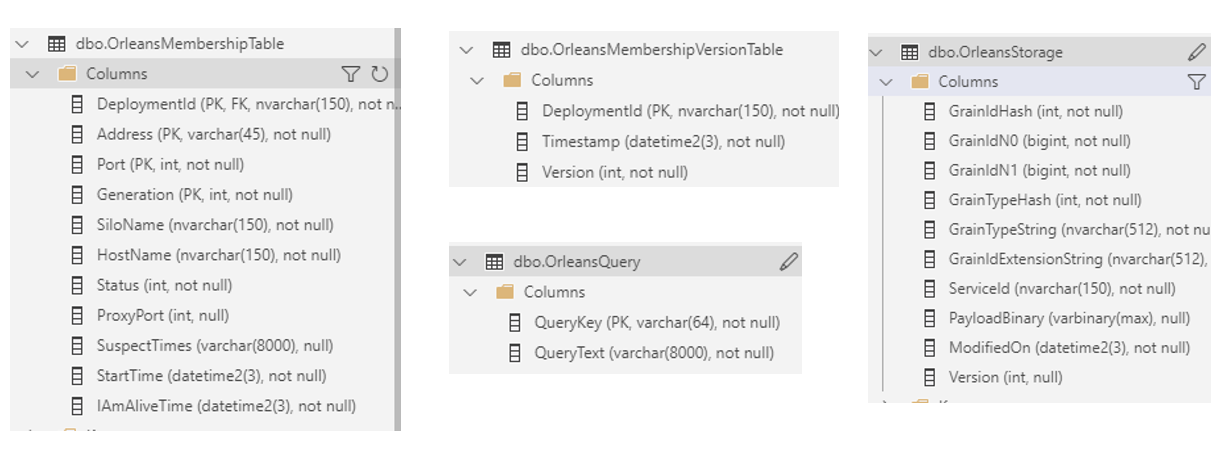
All scripts for creating these tables can be found here.
OrleansQuery – used for queries executed by the Orleans cluster.
OrleansMembershipTable – table where active/inactive Silos and their IP addresses are stored.

OrleansMembershipVersionTable – table that stores the list of Orleans clusters. This table contains a “Version” column showing the deployed cluster version number.

OrleansStorage – for each Grain instance (identified by GrainIdHash or GrainIdExtensionString), there will be a row containing the Grain’s state saved in one of the formats: binary, XML, or JSON. State is stored in columns PayloadBinary, PayloadXml, or PayloadJson.
Here’s what it looks like in the table:

Note: the Grain’s version is just a counter that increments every time the Grain’s state changes and is saved to the table.
There are also 2 other table types worth mentioning:
Reminders – Orleans provides two mechanisms, called timers and reminders, which allow developers to schedule periodic Grain behavior.
Example:
using Orleans.Runtime;
using Orleans.Timers;
namespace Timers;
public sealed class PingGrain : IGrainBase, IPingGrain, IDisposable
{
private const string ReminderName = "ExampleReminder";
private readonly IReminderRegistry _reminderRegistry;
private IGrainReminder? _reminder;
public IGrainContext GrainContext { get; }
public PingGrain(
ITimerRegistry timerRegistry,
IReminderRegistry reminderRegistry,
IGrainContext grainContext)
{
// Register timer
timerRegistry.RegisterTimer(
grainContext,
asyncCallback: static async state =>
{
// Do work...
await Task.CompletedTask;
},
state: this,
dueTime: TimeSpan.FromSeconds(3),
period: TimeSpan.FromSeconds(10));
_reminderRegistry = reminderRegistry;
GrainContext = grainContext;
}
public async Task Ping()
{
_reminder = await _reminderRegistry.RegisterOrUpdateReminder(
callingGrainId: GrainContext.GrainId,
reminderName: ReminderName,
dueTime: TimeSpan.Zero,
period: TimeSpan.FromHours(1));
}
void IDisposable.Dispose()
{
if (_reminder is not null)
{
_reminderRegistry.UnregisterReminder(
GrainContext.GrainId, _reminder);
}
}
}Streams – Orleans Streaming provides abstractions and APIs that simplify and improve reliability when working with streams. In Orleans, a Stream is a logical entity that always exists and never fails. Identified by StreamId, Streams decouple data production from consumption in both time and space. They work equally well with grains and Orleans clients and integrate with many queue technologies, including Event Hubs, Service Bus, Azure Queues, and Apache Kafka. See more in the docs.
🚀 Getting Started with Orleans

For more details about creating a project, check out the documentation. There are also sample projects for different use cases.
1. We need to create 4 .NET projects:
- Silo – the Silo project
- Client – the client implementation
- Grain Interfaces – contracts for Grains
- Grains – Grain implementations
2. Add references
- In Grains, reference GrainInterfaces.
- In Silo, reference Grains.
- In Client, reference GrainInterfaces.
3. Add NuGet packages to projects:
Silo
Microsoft.Orleans.ServerMicrosoft.Extensions.Logging.ConsoleMicrosoft.Extensions.Hosting
Client
Microsoft.Orleans.ClientMicrosoft.Extensions.Logging.ConsoleMicrosoft.Extensions.Hosting
Grain Interfaces
Microsoft.Orleans.Sdk
Grains
Microsoft.Orleans.SdkMicrosoft.Extensions.Logging.Abstractions
4. Create Grain Interface
namespace GrainInterfaces;
public interface IHello : IGrainWithIntegerKey
{
ValueTask<string> SayHello(string greeting);
}5. Implement Grain Class
using GrainInterfaces;
using Microsoft.Extensions.Logging;
namespace Grains;
public class HelloGrain : Grain, IHello
{
private readonly ILogger _logger;
public HelloGrain(ILogger<HelloGrain> logger) => _logger = logger;
ValueTask<string> IHello.SayHello(string greeting)
{
_logger.LogInformation("""
SayHello message received: greeting = "{Greeting}"
""",
greeting);
return ValueTask.FromResult($"""
Client said: "{greeting}", so HelloGrain says: Hello!
""");
}
}6. Implement Silo
Register SQL clustering and SQL Grain storage in startup.cs:
builder.Host.UseOrleans((context, siloBuilder) =>
{
var connectionString = context.Configuration["DBConnectionString"]!;
siloBuilder.UseAdoNetClustering(options =>
{
options.ConnectionString = connectionString;
options.Invariant = "Microsoft.Data.SqlClient";
});
siloBuilder.AddAdoNetGrainStorage("orleans", options =>
{
options.ConnectionString = connectionString;
options.Invariant = "Microsoft.Data.SqlClient";
});
});7. Implement Client
Finally, configure a client to connect with Grains. Cluster configuration must match the Silo setup.
using Microsoft.Extensions.Logging;
using Microsoft.Extensions.Hosting;
using Microsoft.Extensions.DependencyInjection;
using GrainInterfaces;
var connectionString = context.Configuration["DBConnectionString"]!;
IHostBuilder builder = Host.CreateDefaultBuilder(args)
.UseOrleansClient(client =>
{
client.UseAdoNetClustering(options =>
{
options.ConnectionString = connectionString;
options.Invariant = "Microsoft.Data.SqlClient";
});
})
.ConfigureLogging(logging => logging.AddConsole())
.UseConsoleLifetime();
using IHost host = builder.Build();
await host.StartAsync();
IClusterClient client = host.Services.GetRequiredService<IClusterClient>();
IHello friend = client.GetGrain<IHello>(0);
string response = await friend.SayHello("Hi friend!");
Console.WriteLine($"""
{response}
Press any key to exit...
""");
Console.ReadKey();
await host.StopAsync();🧪 Testing
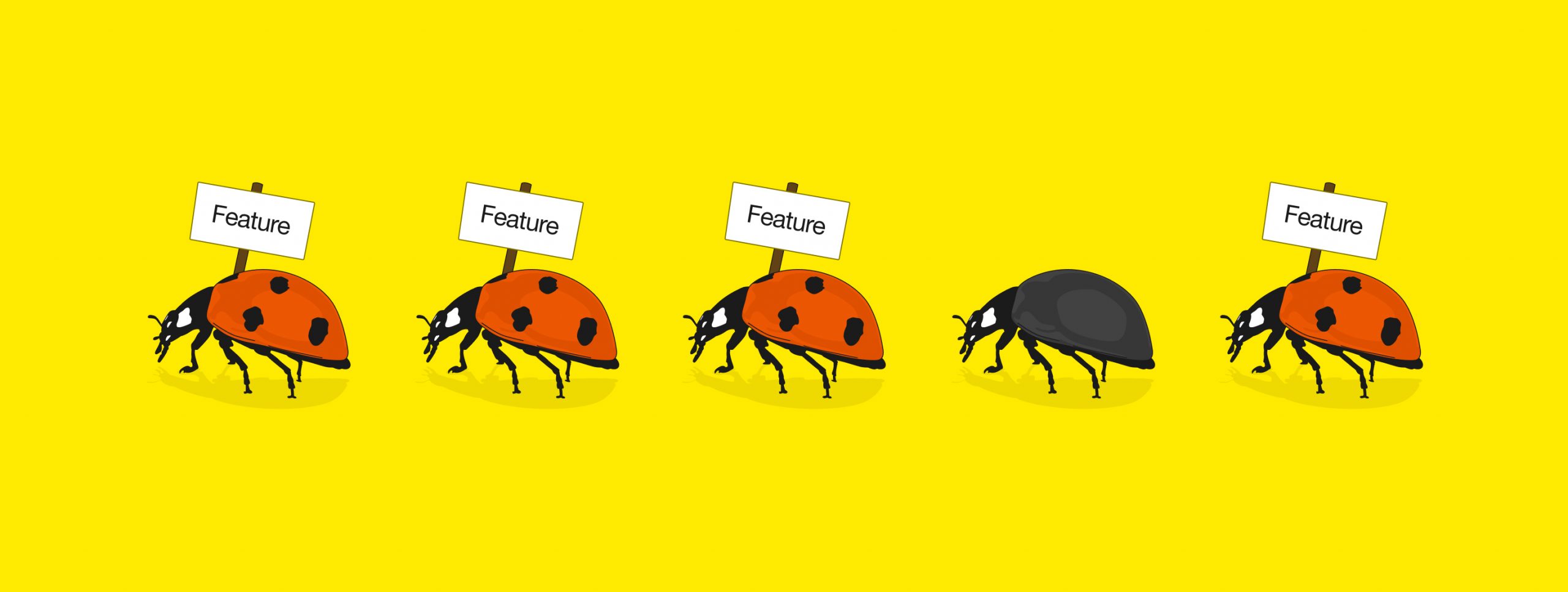
Microsoft has already taken care of this by providing the NuGet package Microsoft.Orleans.TestingHost.
Here’s an example of a unit test that checks Grain functionality:
using Orleans.TestingHost;
namespace Tests;
public class HelloGrainTests
{
[Fact]
public async Task SaysHelloCorrectly()
{
var builder = new TestClusterBuilder();
var cluster = builder.Build();
cluster.Deploy();
var hello = cluster.GrainFactory.GetGrain<IHelloGrain>(Guid.NewGuid());
var greeting = await hello.SayHello("World");
cluster.StopAllSilos();
Assert.Equal("Hello, World!", greeting);
}
}📊 Orleans Benchmarks

Okay, everything sounds promising, but you might ask:
Cool, but what about benchmarks?
After all, the team will need to spend significant time learning how to work with this framework — what do we get in return?
The first benchmark is from the Microsoft team, comparing Orleans 3.0 to Orleans 7:
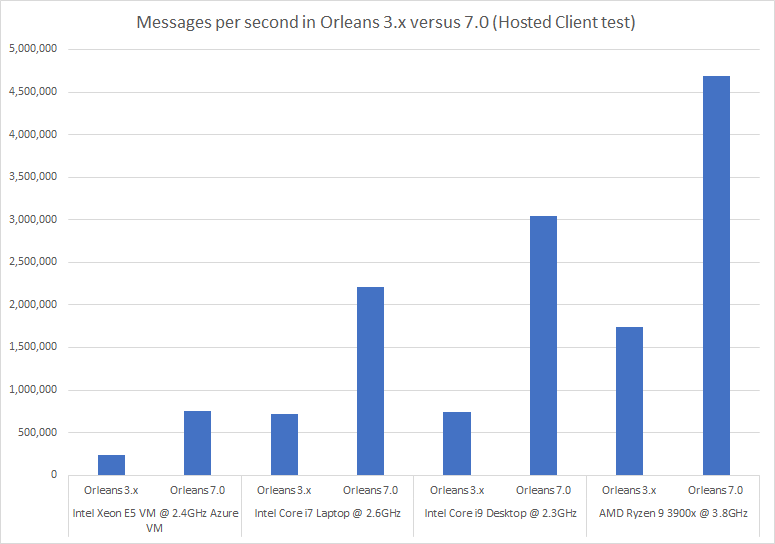
As we can see, Orleans, with a hosted client, can handle up to 4.5 million messages per second.
The second benchmark compares .NET actor model frameworks:
- Dapr 1.7.0
- Akka.NET 1.4.36
- Proto.Actor 0.32
- Orleans 3.6.0
The test was performed in 2022, which is somewhat outdated since Orleans’ performance has improved significantly by version 7. Still, the results are worth noting.
Test environment details:
The VMs are 4 core / 16GB each, with 10Gbps+ expected network bandwidth (D4s v4 and D4s v5 Azure VMs).
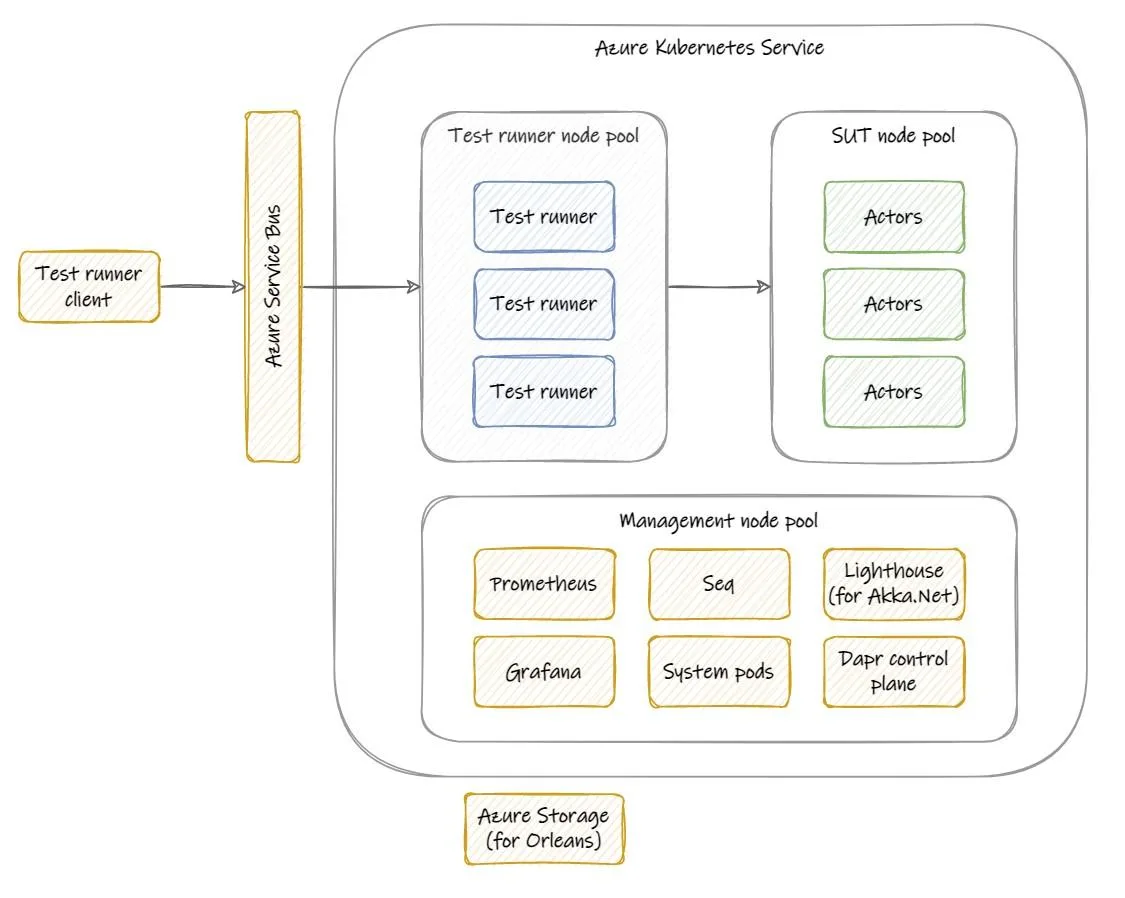
In the first test, a simple ping-pong message exchange was used between the test runner and the actor. The runner generated a random string X, wrapped it in a Ping message, and expected "Hello " + X in the Pong reply.
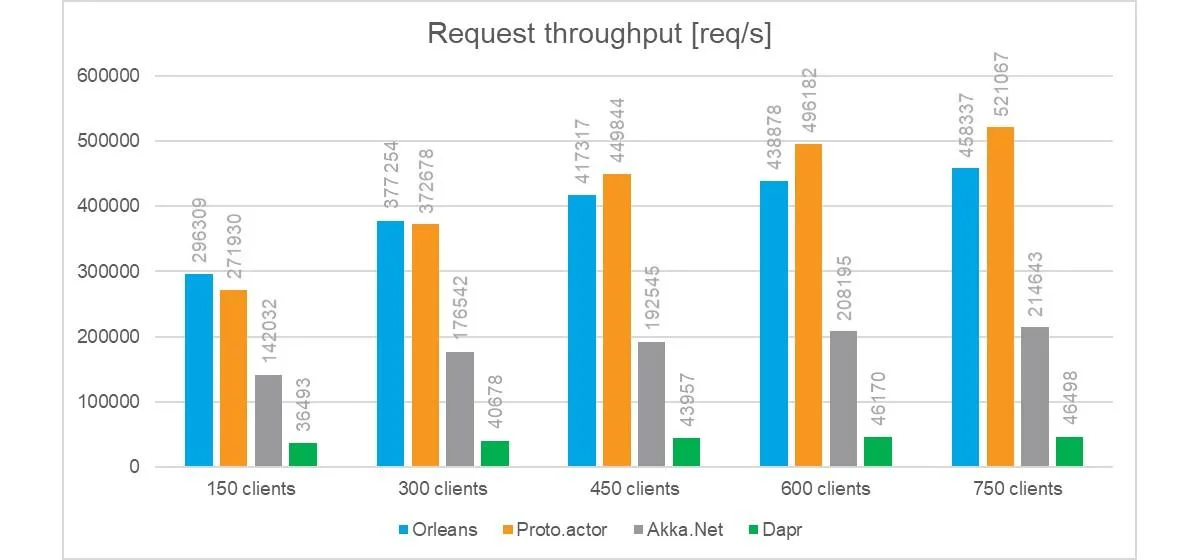
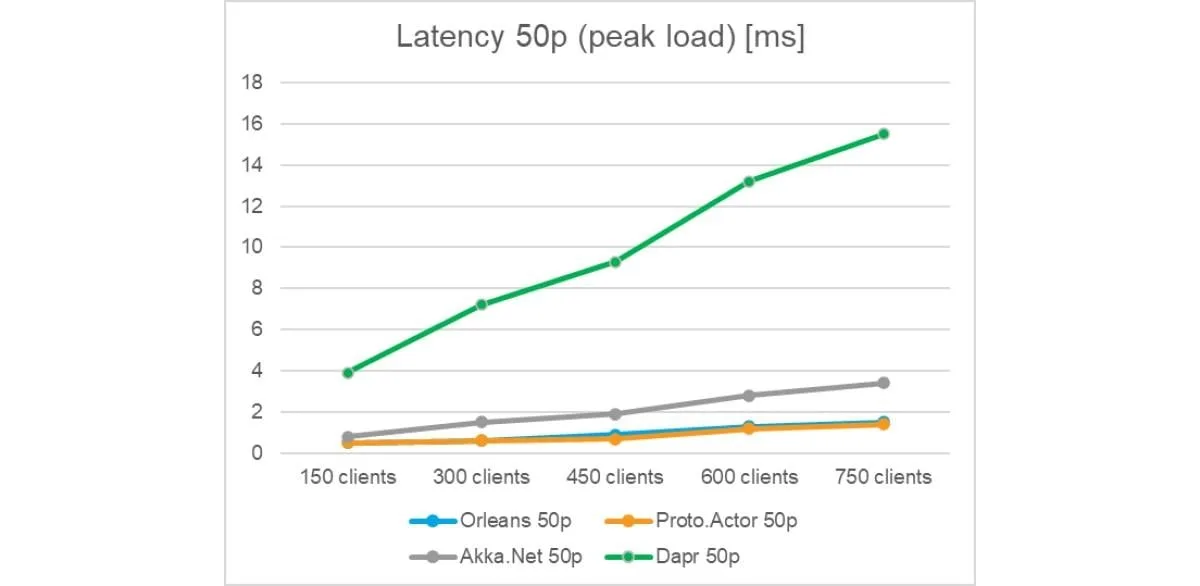
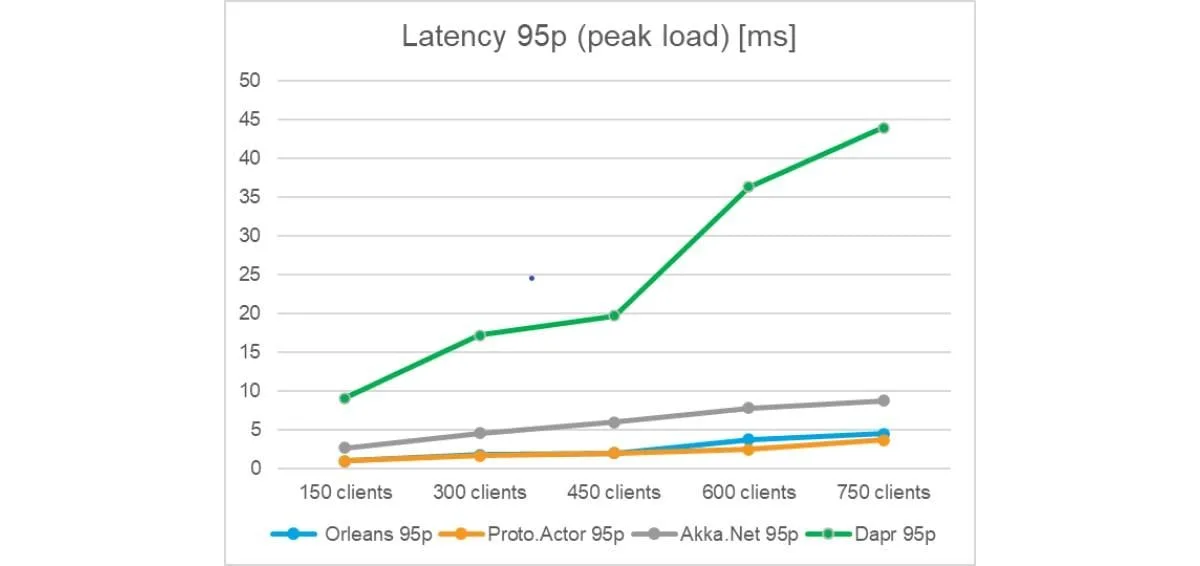
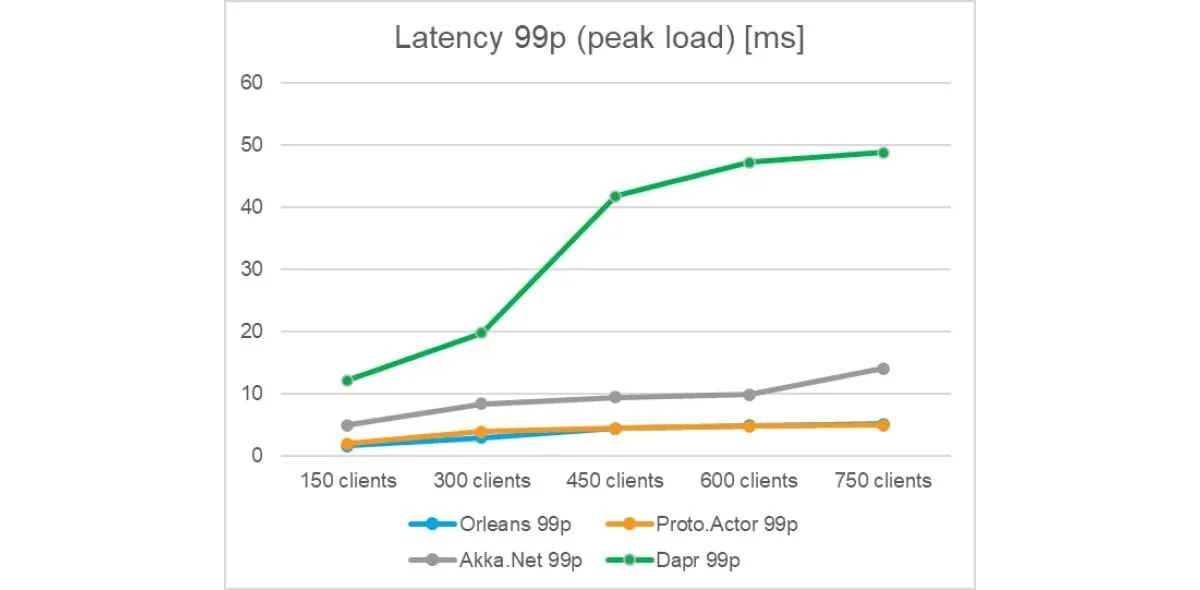
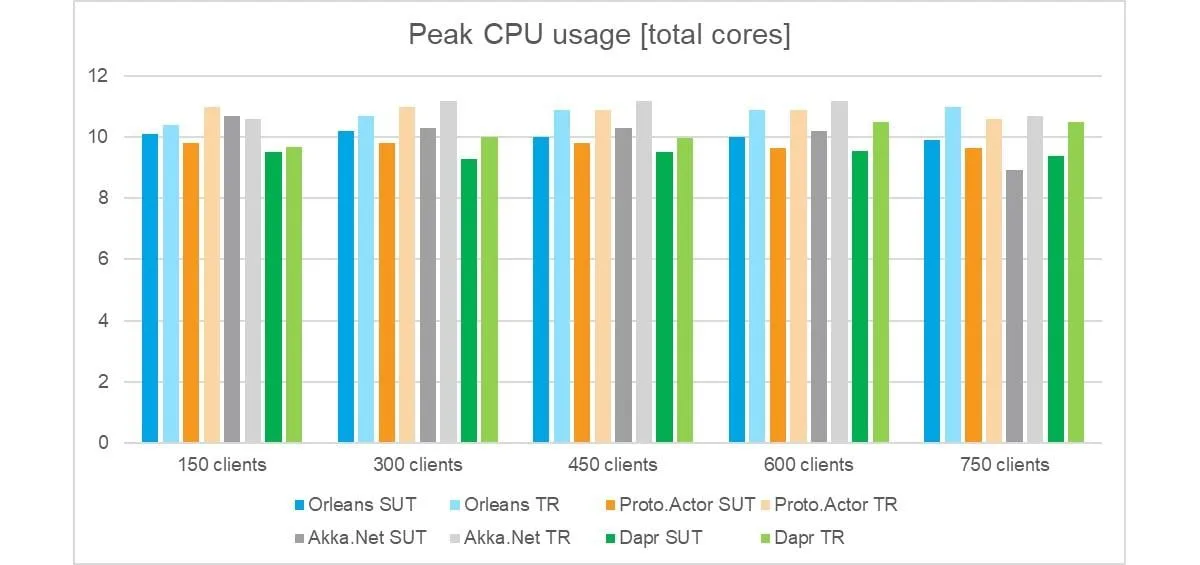
In another test, the author measured actor activation by sending them empty Ping messages.
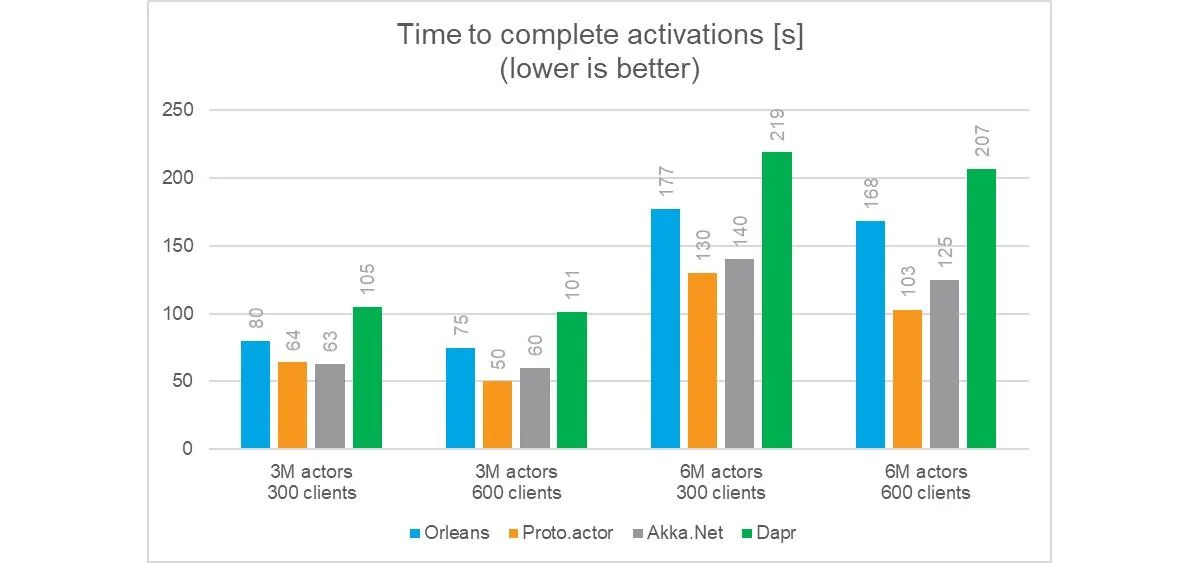
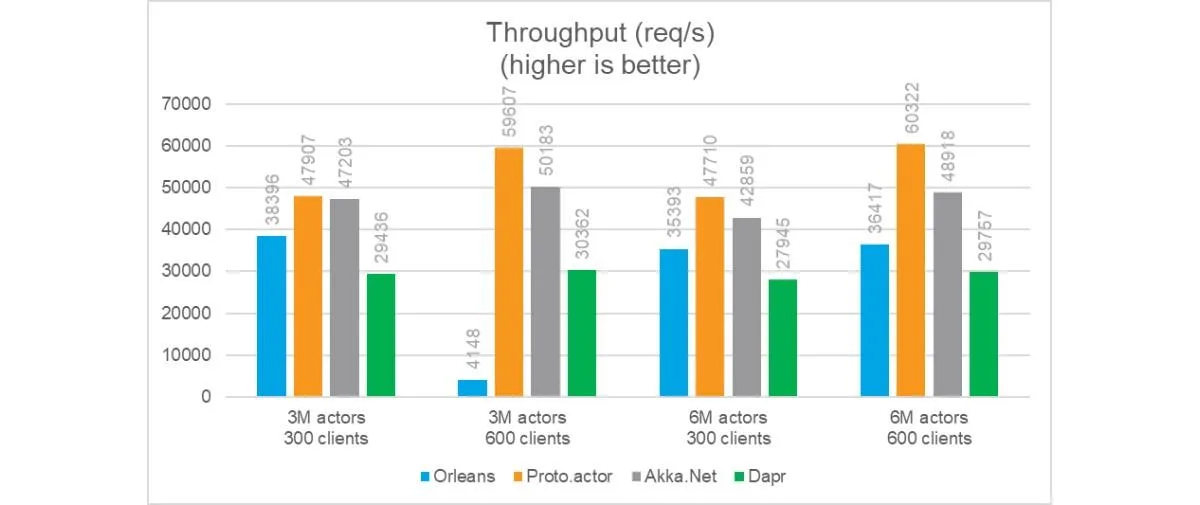
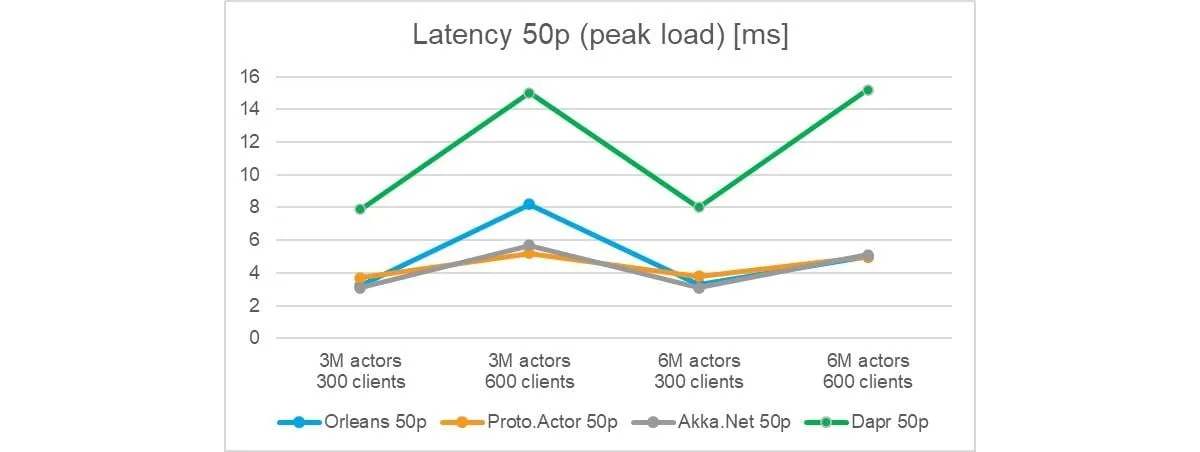
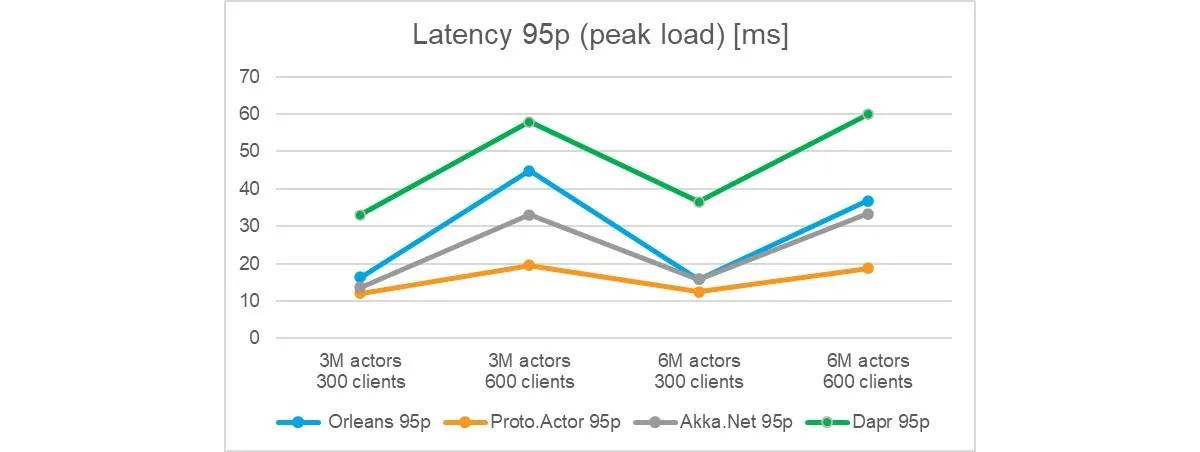
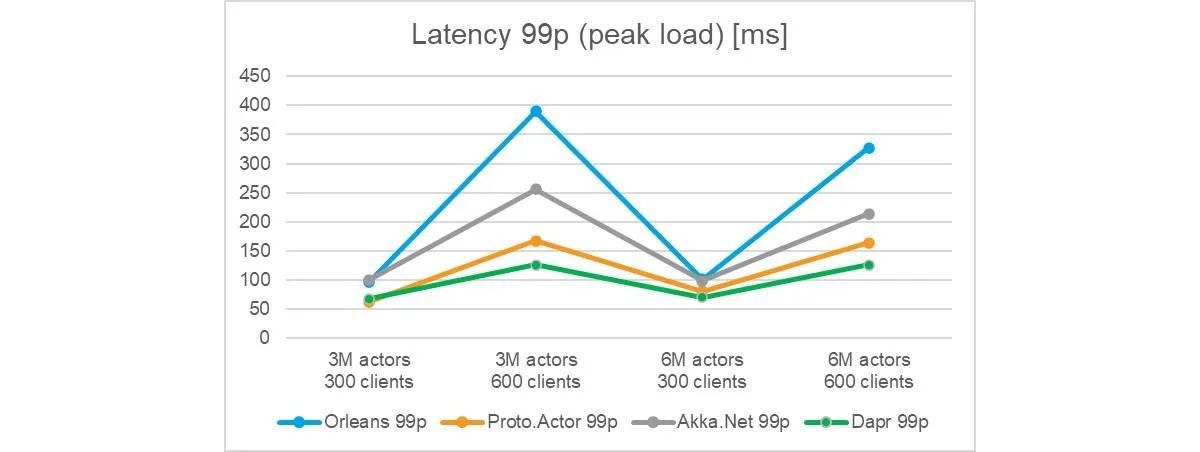
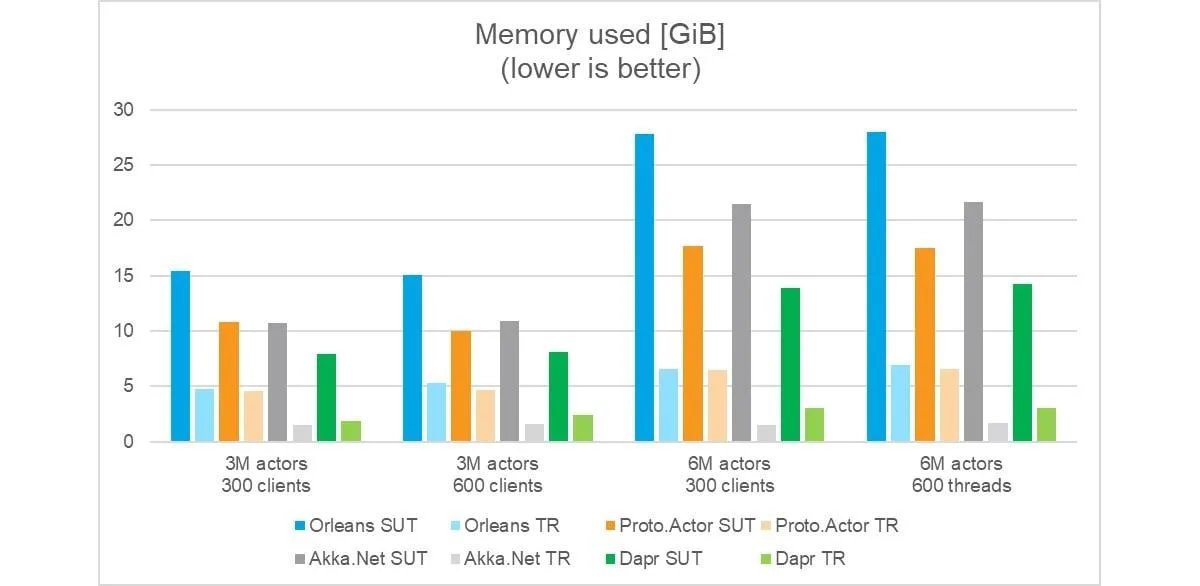
🧽 Conclusion
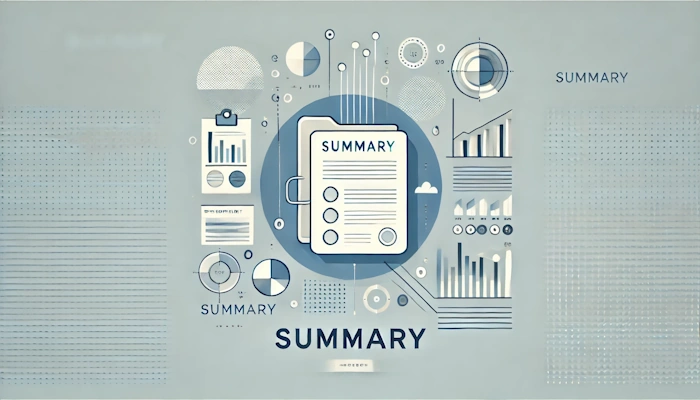
Microsoft Orleans takes away the boilerplate of distributed programming. Instead of wrestling with caching layers, message brokers, and retry logic, you work with grains — simple building blocks that handle state, scale, and resilience out of the box.
If you’re building cloud-native systems, such as online games, IoT platforms, financial services, or messaging apps, Orleans offers an elegant and proven approach. It’s the framework behind Halo, Gears of War, and Skype, so you know it’s production-ready at massive scale.
From my perspective, the biggest win is developer focus. In projects I’ve seen, 80% of the time goes into managing state and failures. Orleans removes that burden so your team can invest energy where it matters most — delivering features and business value.
👉 If your next project needs to handle millions of concurrent entities or users, Orleans is worth a serious look.
Next Steps:
- Dive deeper into Orleans by exploring the official documentation, which contains detailed guides and examples.
- Try Orleans in action: Visit the Orleans GitHub repository to find sample projects for different scenarios.
- Orleans Deployment: Learn how to deploy Orleans in Azure, Kubernetes, Service Fabric, and other environments.
- Adopt Orleans in your project: Try Orleans in your next project and evaluate its ability to build high-performance and fault-tolerant systems.
